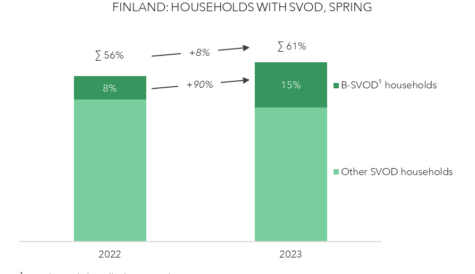
After more than 40 years of operation, DTVE is closing its doors and our website will no longer be updated daily. Thank you for all of your support.
Does the UK Media Bill mark a comeback for PSBs?
 British public service broadcasters (PSBs) may finally be able to recover some ground in their unequal battle for visibility with global streamers such as Netflix. The UK government this week published the draft Media Bill, which is intended to even the playing field between traditional broadcasters and streamers.
British public service broadcasters (PSBs) may finally be able to recover some ground in their unequal battle for visibility with global streamers such as Netflix. The UK government this week published the draft Media Bill, which is intended to even the playing field between traditional broadcasters and streamers.
The new draft legislation will see pubcasters such as the BBC, ITV, Channel 4, Channel 5, STV and S4C receive new privileges that should help them grow their audience, boost high-quality British content and invest in new technologies to keep up with the streaming giants. The new bill also imposes further regulations on streaming services consumed in the UK which sees SVOD platforms such as Netflix, Amazon Prime Video and Disney+ subjected to a new Ofcom content code.
The newly introduced regulation will allow VoD viewers to be able to formally complain to Ofcom, which the UK media watchdog will have more power to investigate and issues fines of up to £250,000 or even restrict a service’s availability in the UK on the basis of audience protection measures.
The bill contains measures that could help expand PSBs’ reach with audiences whilst breaking barriers that have disadvantaged broadcasters in their race against the streaming giants. For example, Channel 4 will be allowed to produce and have ownership over its programming, something that has not been the case until now.
Omdia’s principal analyst, Tim Westcott says: “The proposals do not seem onerous and are mostly aimed at levelling the playing field between UK PSBs and international services. It is significant that the proposal to fine streamers up to 5% of UK revenues has been watered down from earlier drafts.”
The bill includes measures ensuring video on demand viewers can more easily discover PSBs services such as BBC iPlayer and ITVX on smart TVs, set-top boxes, and streaming sticks, as well as making them more accessible to those with seeing and hearing impairments.
It marks a move on the part of the government to promote traditional broadcasters, and protect PSBs’ future against the growing power of SVODs.
Westcott says: “Prominence is a major issue for the on-demand services operated by UK PSBs, like the BBC iPlayer and ITVX. That will make these services more visible for the increasing numbers of consumers using smart TVs and streaming devices.”
Jamie Heatly, a media lawyer at international legal practice Osborne Clarke, says “there are a number of elements which will be welcomed by UK public services broadcasters (PSBs), particularly when competing with global streaming players.”
“By relaxing quota rules and allowing public service broadcasters to fulfill their programming commitments across their OTT services as well as channels, the bill could stimulate the commissioning and acquisition of a greater volume and range of shows.”
He notes that “international streaming services face a swathe of additional measures. The bill overhauls the traditional scope of UK on-demand law by extending Ofcom’s jurisdiction to services which are not based in the UK. Taken together with rule changes following Brexit, multi-territory channels and VoD services are likely to find themselves subject to dual regulation in the EU and UK. This extension of scope is compounded by a far stricter content code for some, in a major move away from the relatively light touch rules currently in place for on-demand services. “
“In terms of platform distribution arrangements, depending on how stringently the requirements are applied, the proposed digital prominence regime is likely to limit the placement and marketing options available to non-PSB content providers.”
This does raise the concern, along with the further regulations put into force by Ofcom under the guidelines of protecting audiences from a wider range of harmful material, that there may be a negative impact on international streaming services’ operations in the UK and on their viewing figures.
Heatly says: “The proposal to extend jurisdiction to certain non-UK services, who currently fall outside of Ofcom’s remit, and to apply stricter standards to their content and accessibility measures, will have a significant impact on the operation of those businesses. Particularly in light of the heightened risk of enforcement, we are likely to see streamers needing to invest in additional development work as well as on-going compliance checks to ensure they meet the new requirements. A new VoD standards code would also influence decisions on whether content is suitable for UK distribution, and whether additional protection measures (such as age-gating or ratings) might be needed.”
Westcott argues that the bill will not have a massive impact on Netflix, which “has already invested a lot in the UK – Omdia estimates Netflix has invested close to $1.3 billion in UK content to date”. However, he says, “other streamers like Disney+ have some ground to make up.”
No doubt the UK media bill is a win for PSBs, but it begs the questions of whether it levels the playing field between broadcasters and streamers – or creates a new power imbalance and gives government greater power over media.


